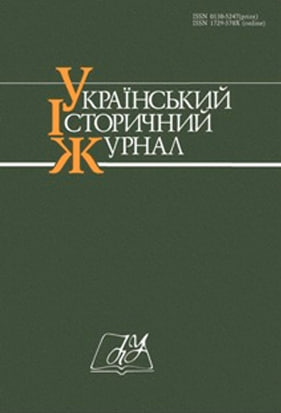The Hetmanate of Pavlo Skoropadskyi: the Little Russian Complex of the Ruling Elite
DOI:
https://doi.org/10.15407/uhj2023.04.059%20Abstract
The purpose of the study is to clarify the influence of the Little Russian identity complex of the ruling elite with regard to the content, form, and consequences of the Ukrainian State building and the reasons for its transition from independence to federation with non-Bolshevik Russia.
The methodological basis is the principles of historicism, scientificity, problemchronological, and personification of events. The key concepts of the “Little Russian identity” and “ruling elite” are specifically considered in the context of the real state formation history in 1918.
The scientific novelty consists in the systematic coverage of the dichotomous Russian-Ukrainian mentality phenomenon of the representatives of the supreme legislative and executive authority under the specific conditions of the new hetmanate.
Conclusions. The principles of a new state building declared by P. Skoropadskyi required a radical change of management personnel, especially its highest echelon — the Council of Ministers. Its main backbone was made up of the representatives of the all-Russian left-liberal party of the Cadets — well-known Russian figures of Ukrainian ethnic origin with a Little Russian complex. The state-political model of the hetmanate had a dualistic nature. The Council of Ministers, the structure of ministries, and advisory bodies were formed according to pre-revolutionary models and the hetman’s administration — according to the archaic Ukrainian tradition. The Russian-Ukrainian binary of state-building depended on the predominance of Russian or Ukrainian segments of the Little Russian identity in the mentality of ministers. A team of Ukrainian patriots-educators defended true national values and implemented them in the cultural and educational sphere. In the Ministry of Roads, the state language was implemented by directive. At the same time, the judicial system was established according to the model of the Russian imperial judicial system. The former ranks of the gendarme corps and the Russian police department returned to the law enforcement agencies, widely applying repressive measures against Ukrainian figures. Almost all the commanders of the cadre corps were ethnic Ukrainians, but in a crisis situation, none of them stood up for the defense of the hetman state. Aware of Germany’s defeat in World War I, ten cadet ministers issued a declaration on the need to change the independent political course of the hetmanate to a pro-Russian one. This position of the ministers proved that the recognition of Ukraine’s independence was situational for them. These provisions were embodied in the Charter issued by P. Skoropadskyі on federation with non-Bolshevik Russia and de facto meant renunciation of the state independence and return to the bosom of restored Russia. The appearance of the Charter was determined not only by geopolitical challenges but also by the hetman’s ambivalent Little Russian mentality.


